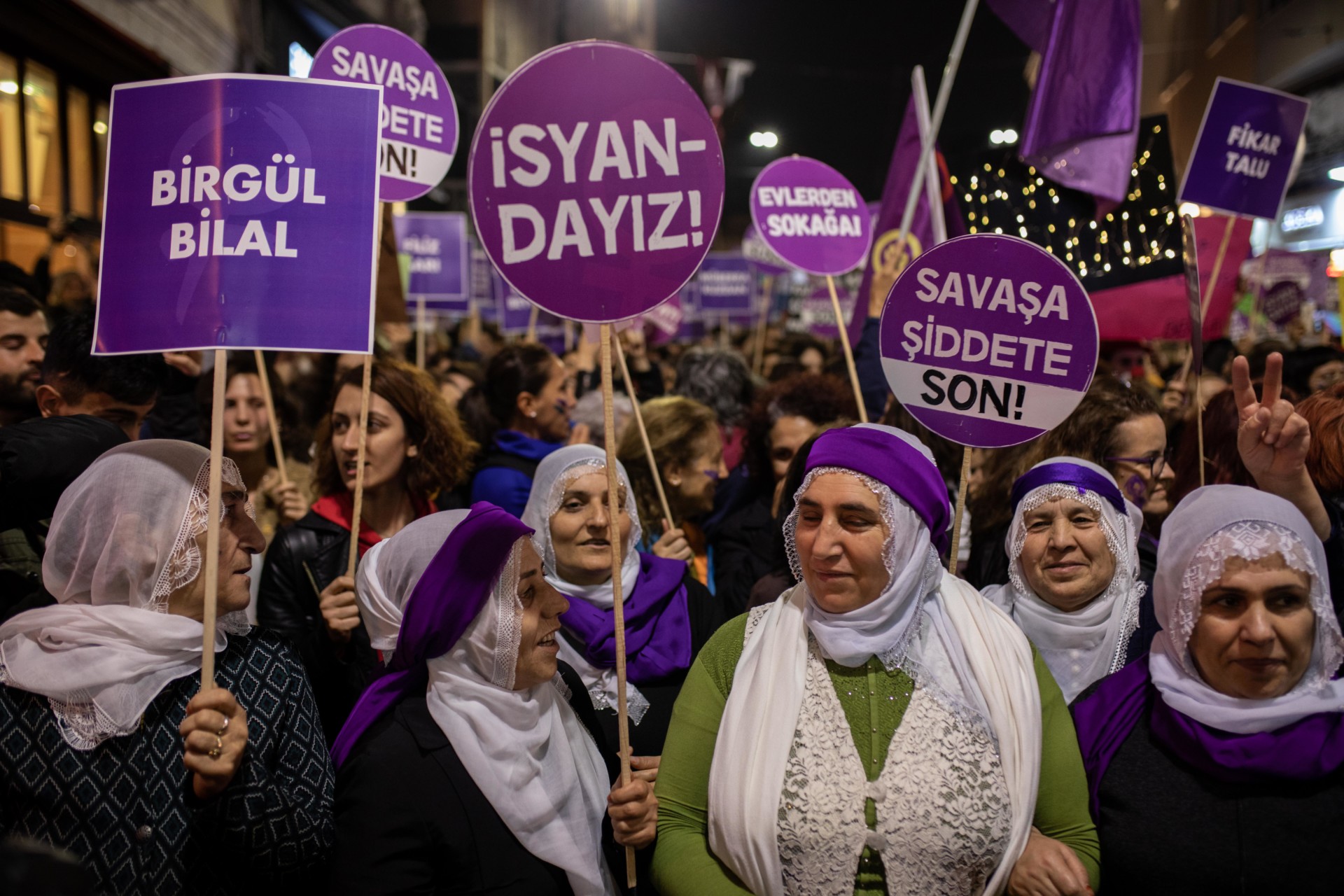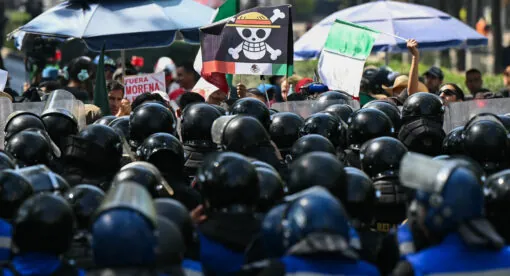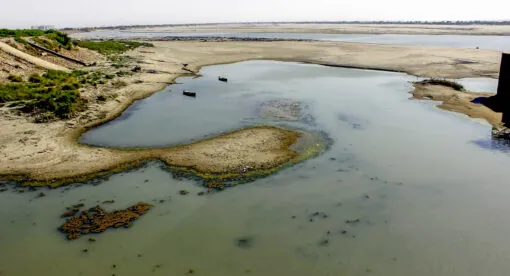The Kurdish women’s movement in Turkey has made meaningful progress toward equality amid a conflict whose gendered dimension is directly linked to the country’s broader security problems.
The ongoing conflict between Turkey and the Kurdistan Workers’ Party (PKK), itself a phase in a longer conflict between the Turkish state and its Kurdish minority, must be understood along gendered lines as well as geopolitical and ethnic ones. While the Turkish security establishment uses pervasive violence and discrimination against Kurdish women as a tactic of war and political repression, the Kurdish women’s movement that originated in Turkey has responded by advancing gender equality in a wide array of military and political structures that share its ideology. If the United States wants to address the crisis of authoritarianism and militarism in Turkey in line with its own interests, it cannot ignore the proven successes of a locally rooted women’s movement that has made concrete advances.
Since the founding of the modern Turkish republic on nationalist principles in 1923, successive Turkish governments have subjected the Kurdish people, who make up nearly 20% of Turkey’s population and live primarily in the country’s southeast, to massacres, systemic oppression, and forced assimilation.
This conflict between the state and its largest ethnic minority entered a new phase in the late 1970s with the establishment of the PKK, an armed national liberation movement that sought the creation of an independent, socialist Kurdistan. The group launched its first attacks on Turkish military outposts in August 1984.
The subsequent war has claimed tens of thousands of lives and displaced millions of Kurdish civilians. It has also spread beyond Turkey’s borders, further destabilizing already complex conflicts in Syria and Iraq.
Between 2013 and 2015, the Justice and Development Party (AKP) government became the first Turkish government not only to move away from a policy of full denial of Kurdish identity but also to seriously attempt peace talks and seek a political solution to the conflict. Since the collapse of these negotiations, however, renewed conflict has coincided with democratic backsliding and the development of a more militaristic Turkish foreign policy — both matters of serious concern to the United States, which counts Turkey as a longstanding ally.
These developments are the source of the tensions between Turkey and the Syrian Democratic Forces (SDF) that have led to two Turkish invasions of Syrian territory and posed an ongoing challenge to the U.S.-led counter-ISIS campaign. They also fuel the authoritarian political forces within Turkey’s borders that have contributed to Turkey’s worsening relationships with its allies and warming ties with states like Russia.
The links between gender equality, peace, and security are well established. As the Biden administration seeks to promote the rights of women and girls, support democracies against autocracies, and de-escalate tensions in the Middle East in favor of diplomacy, promoting a gender-inclusive peace settlement to a conflict directly impacting the politics and foreign policy of a key NATO member would align both with these commitments and other interests.
The Kurdish Women’s Movement
Kurdish women in Turkey developed and implemented a unique paradigm for women’s empowerment that is now accepted, to varying degrees, by women and men of many ethnicities across a variety of military and political institutions.
Armed conflicts and national liberation movements often provide women with opportunities to move beyond the traditional social roles imposed by conservative societies. However, women are generally expected to subordinate gendered demands to the immediate concerns of the war effort or national cause.
Turkey’s Kurdish movement was initially no different. Yet two simultaneous and mutually constitutive processes occurring over four decades — a bottom-up insistence by the increasing numbers of women in the movement that women’s liberation be prioritized as a part of the Kurdish struggle, and a top-down shift in the movement’s official ideology — have largely overcome this dynamic.
These processes began within the PKK itself in the late 1980s and early 1990s and spread to the civilian realm in the mid-2000s as legal pro-Kurdish political parties that sought a peaceful resolution to the conflict grew stronger.
Today, the political philosophy shared by the Kurdish freedom movement is based on the principle that the oppression of women by men leads to all other forms of oppression. Three specific measures to increase women’s representation and political power are widely implemented: a co-chair system to ensure parity in leadership; women’s quotas to ensure balanced representation; and the principle of parallel, autonomous women’s organizations that work alongside mixed-gender organizations and have the ability to critique and overrule them on issues concerning women.
These measures have successfully increased women’s meaningful political participation. The pro-Kurdish Peoples’ Democratic Party (HDP), Turkey’s second-largest opposition party, implements all three.
As a result, 36% of HDP MPs elected in the most recent parliamentary elections were women — though women make up just 17% of the Turkish parliament. The discrepancy is wider at the local level: 65% of all female mayors formally elected in Turkey’s most recent municipal elections were from the HDP, though the party received just 4% of the national vote.
They have also caused social change. A study of all municipalities in Turkey that had female mayors between 2004 and 2014 found that only those controlled by the pro-Kurdish parties at the time (the DTP and BDP) had implemented substantive policies to address violence against women. Municipalities run by women from the nationalist-Islamist AKP and secular-nationalist Republican People’s Party (CHP) did not take these steps. The study noted that there had been a decrease in rates of domestic violence in the provinces where pro-Kurdish parties were active, suggesting that these policies had the intended effect.
Kurdish voters who support pro-Kurdish parties are also less opposed to women’s leadership than Kurdish voters who support the ruling AKP. According to a 2018 survey, Kurds who voted for the pro-Kurdish BDP were significantly less likely to agree with the statements that “men make better political leaders than women” and that “if a woman earns more money than her husband, it is almost certain to cause problems” than Kurds who voted for the AKP or other mainstream parties.
Turkey’s Response
While the Kurdish movement has taken on women’s freedom as a cause equivalent in relevance to Kurdish national liberation, Turkey’s efforts to seek a military solution to the conflict with the PKK systemically and disproportionately target, harm, and disempower women and girls.
The most obvious impact is that of direct state violence against individuals. Turkish security forces regularly use sexual and gender-based violence as an intimidation tactic in Kurdish regions, and they are virtually never punished for these abuses.
In a 2002 report, Amnesty International found that “the majority of women [in Turkey] who report sexual violence by state security forces are Kurdish, or express political opinions that are unacceptable to the military or the government.”
High-profile cases have targeted Kurdish women who peacefully advocate for gender equality and minority rights. Women and girls without political affiliation have been impacted as well, particularly during periods of heavy military activity in Kurdish regions.
Survivors face systemic social and legal barriers to reporting these abuses — up to and including the possibility of death or imprisonment. Human rights organizations have documented cases of women and girls who were murdered by male relatives after it was revealed that they had been raped by security forces. In 2001, after lawyers, human rights groups, and survivors held a landmark conference on rampant sexual violence by security forces in Turkey, 19 participants were prosecuted on anti-state charges.
These abuses are not a relic of a previous era of more intense conflict. A 2017 United Nations report cited sexual violence — including rape, threats of rape, and the taking and dissemination of nude photographs — as a form of torture and degrading treatment used by Turkish security forces when fighting resumed in Kurdish regions after the breakdown of peace talks in 2015. The Human Rights Foundation of Turkey found that in 2020 alone, about 40% of torture victims in Turkey reported being subjected to some form of sexual violence in custody.
Turkey’s political strategies to counter both the PKK and legal, civilian Kurdish groups also harm women and girls. Individual Kurdish women who peacefully advocate for women’s rights and civilian institutions created by and for Kurdish women to address violence and discrimination have increasingly become targets in the state’s “war on terror.”
Since 2015, many of Turkey’s prominent female Kurdish politicians have been removed from elected office, jailed, or both. Five of the 10 current or former HDP MPs currently in prison are women. Prosecutors have cited the use of the co-chair system at the municipal level as evidence of terrorist activity in prosecutions of elected HDP mayors. Kurdish women’s institutions, particularly those that address gender-based violence, have also faced legal repercussions on national security grounds.
While equating legal Kurdish women’s organizations with terrorism, the Turkish government has used the fight against the PKK to promote Kurdish groups that are hostile to gender equality.
The “village guards,” a paramilitary group created in the 1980s to fight the PKK, are organized along tribal lines — strengthening some of the most conservative and patriarchal elements of Kurdish society. These militias have been accused of serious crimes against women and girls and of using their relative power to escape punishment for these crimes. Human Rights Watch cited sexual violence perpetrated by “village guards” in a 2006 statement arguing that the system should be abolished.
A Kurdish Islamist paramilitary organization that received state support against the PKK, known as Hezbollah, became infamous for the assassination of Konca Kurish, a Turkish feminist who advocated for women’s rights in a religious framework. While the armed group is now defunct, its political affiliate, HUDA-PAR, has lent its support to Erdogan in Turkey’s southeast.
Erdogan and the AKP also openly compete for Kurdish votes in their own right — something Turkey’s secular nationalist ruling parties have not done. The AKP regularly comes in second to the pro-Kurdish parties in Kurdish provinces, earning the votes of socially conservative Sunni Muslims there. This is not only an assimilation strategy on the part of the government, promoting religious over ethnic identity, but also a strategy that promotes traditional social roles for women and does little to challenge discrimination.
Why It Matters
Widespread violence and discrimination against women and girls is an integral part of Turkey’s effort to seek a military solution to the conflict with the PKK and to the broader Kurdish question. That conflict, in turn, is a fundamental driver of Turkish authoritarianism and militarism in the region.
The gendered dimension of the conflict is directly linked to the broader security problems that concern Turkey’s allies. States that have higher levels of violence and discrimination against women are more likely to engage in violent conflict, more likely to use force first in an international dispute, and less likely to abide by international norms and treaties. These statements can all be flipped: States where women are safe and secure are more peaceful.
The status of women in Turkey — particularly Kurdish women, who are subjected to the greatest degree of violence — is thus directly related to the most pressing challenges that the United States faces from the AKP government’s authoritarian and militarist turn.
A sustainable political settlement to the Turkey-PKK conflict that engaged and incorporated the policies and philosophies on women’s inclusion and empowerment developed by Kurdish political and military actors could thus transform the status of women of all ethnicities in Turkey and build inclusive stability across the region. When peace agreements include women, they last longer — and the Kurdish women’s movement has already proven that it can address gender-based violence, enforce legal protections for women, and bring more women into the political sphere, all of which are correlated with more peaceful state behavior.
The United States has legal frameworks in place that recognize the importance of women’s empowerment and leadership for reducing conflict and supporting democracy. There is also an existing case for U.S. engagement in promoting a negotiated political solution to the Kurdish question in Turkey. A political settlement that incorporated the best practices of the Kurdish women’s movement is thus well within U.S. interests. By using its own economic and political leverage vis-à-vis Turkey, engaging European allies and international organizations that have close relationships with Turkey toward the same goal, and supporting democratic and pro-peace opposition and civil society within the country, the U.S. could change its approach to the conflict in support of this outcome.
Meghan Bodette is an independent researcher focused on Turkey, Syria and Kurdish affairs, with a particular focus on women’s rights in these regions and contexts. Bodette is a former editor at The Region, a news site focused on under-reported stories and perspectives from the Middle East, and the founder of the Missing Afrin Women Project, which tracks kidnappings, disappearances and other rights abuses targeting women in Afrin, Syria. Her work has been published by the Wilson Center’s Middle East Program, the National Interest, and North Press Agency.
The views expressed in this article are those of the author and not an official policy or position of the Newlines Institute.






